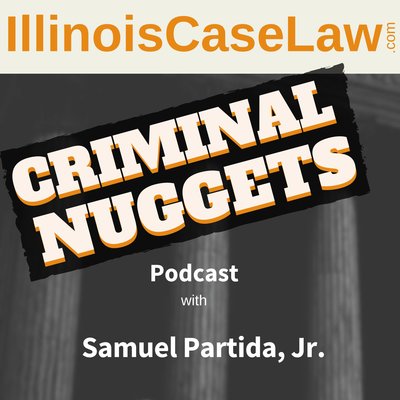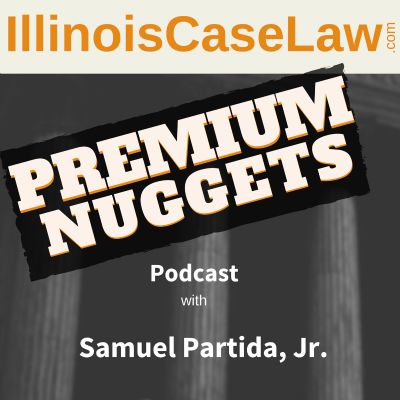Feb 27, 2019
In re Appointment of Special Prosecutor, 2019 IL 122949 (January). Episode 596 (Duration 8:25)
Press not allowed to get grand jury documents through FOIA.
Gist
Mayor Richard M. Daley’s nephew got in a fight the victim. Victim dies and nothing happens.
7 years later a special prosecutor is appointed and a special grand jury indicts the nephew on involuntary manslaughter. There were no obstruction-type charges on any police or prosecutorial officials.
Eventually the nephew plead guilty.
The Report
The special prosecutor released a report to the court outlining the investigation and the reasons for the charges and non charges in the case.
The court unsealed the report and released it to the public.
Press Wants More
The Sun Times and the Better Government Association (BGA) then sought FOIA’s for the grand jury information. These were denied and the denial was upheld by the appellate court.
In its FOIA request, the BGA sought disclosure of the following material from the OSP:
“Documents sufficient to show the names of everyone interviewed by Dan Webb’s special prosecutors in relation to the David Koschman/Richard Vanecko case,” “[c]opies of any and all statements by and communications with Daley family members and their attorneys” and “the same information for Mara Georges [(the City’s Corporation Counsel)],” and “[c]opies of any and all itemized invoices and billing records for the special prosecutor’s team.”
Illinois FOIA
FOIA expressly declares its underlying public policy and legislative intent.
Section 1 provides that “all persons are entitled to full and complete information regarding the affairs of government and the official acts and policies of those who represent them as public officials and public employees consistent with the terms of this Act.” 5 ILCS 140/1 .
Section 1 explains that…
“[s]uch access is necessary to enable the people to fulfill their duties of discussing public issues fully and freely, making informed political judgments and monitoring government to ensure that it is being conducted in the public interest.”
Consequently, section 1 provides that “[i]t is a fundamental obligation of government to operate openly and provide public records as expediently and efficiently as possible in compliance with this Act.”
FOIA is to be liberally construed to achieve the goal of providing the public with easy access to government information. Southern Illinoisan, 218 Ill. 2d at 416.
Exceptions To FOIA
Consequently, FOIA’s exceptions to disclosure are to be construed narrowly so as not to defeat the intended statutory purpose. Thus, when a public body receives a proper request for information, it must comply with that request unless one of FOIA’s narrow statutory exemptions applies. 5 ILCS 140/3(a).
Section 7(1) of FOIA provides that certain categories of records “shall be exempt from inspection and copying.” 5 ILCS 140/7(1). This includes: “Information specifically prohibited from disclosure by federal or State law or rules and regulations implementing federal or State law.” Id. § 7(1)(a).
Tradition of Grand Jury Secrecy
“The grand jury is an English institution, brought to this country by the early colonists and incorporated in the Constitution by the Founders.” People v. Jones, 19 Ill. 2d 37, 42 (1960). The function of a grand jury is not to determine the sufficiency of evidence to convict but rather to determine whether there is probable cause to believe a crime has been committed and, in the process, exonerate innocent individuals accused of crimes.
The policy reasons given for maintaining grand jury secrecy are preventing the flight of persons under indictment or investigation, protecting grand jurors from possible undue influence or intimidation, preventing subornation of perjury, encouraging prospective witnesses to testify freely and truthfully, and protecting the innocent from unwarranted exposure.
Statutory Reasons For Grand Jury Secrecy
Section 112-6 of the Code addresses the secrecy of grand jury proceedings in the Illinois state criminal justice system. Subsection (b) of section 112-6 provides that “[m]atters other than the deliberations and vote of any grand juror shall not be disclosed by the State’s Attorney, except as otherwise provided for in subsection (c).” 725 ILCS 5/112-6(b).
Subsection (c)(1), subject to certain exceptions not relevant here, prohibits the disclosure of “matters occurring before the Grand Jury.” Id. § 112-6(c)(1).
Issue
The BGA contends the appellate court erred in finding that the materials it sought constituted “matters occurring before the grand jury.” It argues the court applied an “unduly broad interpretation” of the phrase. According to the BGA, the phrase should be construed narrowly when it serves as a basis for an exemption under FOIA. The BGA further contends its application should be limited to exempting material actually presented to the grand jury and to documents showing what transpired in the grand jury room.
We disagree.
Analysis
The appellate court determined that all of the requested material, except for the itemized invoices and billing records, constituted “matters occurring before the grand jury” protected from public disclosure by section 112-6 of the Code because their disclosure would reveal the identity of the witnesses and the strategy or direction of the grand jury investigation. 2017 IL App (1st) 161376, ¶¶ 64-67.
We agree with the appellate court’s analysis.
The BGA’s first FOIA request would reveal the identities of the witnesses, which are matters occurring before the grand jury. Matters occurring before the grand jury include the identities of witnesses, and the government is not free to “publish lists of prospective or former grand jury witnesses. And in regard to the BGA’s second FOIA request, it cannot seriously be contended that the disclosure of such statements and communications would not be reflective of statements made before the grand jury revealing the strategy or direction of the grand jury investigation.
Doesn’t FOIA Itself Authorize These Disclosures?
The BGA alternatively argues that, even if the requested materials constitute “matters occurring before the grand jury,” they should still be disclosed pursuant to subsection (c)(3) of section 112-6 of the Code. This subsection allows disclosure of grand jury materials “when a law so directs.” 725 ILCS 5/112-6(c)(3).
The BGA contends that section 3(a) of FOIA is such a law.
Section 3(a) of FOIA provides in relevant part that “[e]ach public body shall make available to any person for inspection or copying all public records.” 5 ILCS 140/3(a) (West 2014). The BGA argues that, under subsection (c)(3) of section 112-6 of the Code, section 3(a) of FOIA is a law that directs the disclosure of the grand jury materials at issue The BGA made the same argument in the appellate court, and it was rejected.
The appellate court reasoned: “We believe that the clause ‘when a law so directs’ in section 112-6(c)(3) addresses situations of particularized necessity, such as disclosure to a court clerk or to confront a witness in a criminal trial with his prior contrary testimony. Despite exhaustive briefing, no party has cited a case where section 112-6 of the Code was held not to trigger a section 7(1)(a) exemption.
We agree with the OSP that adopting the BGA’s expansive interpretation of ‘when a law so directs’ would render the secrecy provisions in section 112-6 of the Code ‘a dead letter,’ because FOIA would effectively nullify them.”
We agree with the appellate court’s reasoning.
If we adopted the BGA’s position, documents could be disclosed through a FOIA request, even if they pertained to matters occurring before the grand jury. As a result, there would be few if any grand jury matters that could not be obtained through a FOIA request. Such a rule would effectively nullify the grand jury secrecy protections provided by section 112-6.
Holding
In sum, section 112-6 of the Code prohibited disclosure of the requested material, triggering the exemption provided by section 7(1)(a) of FOIA. Therefore, we affirm that portion of the appellate court’s judgment that affirmed the chancery court’s order dismissing count I of the BGA’s complaint.
We likewise leave undisturbed that portion of the appellate court’s judgment reversing the chancery court’s order in part and remanding for in camera review of the OSP’s invoices and billing records.
Guided by GTE Sylvania and its progeny, and established Illinois law, we conclude that the City was required to obey the protective orders out of respect for the judicial process. Consequently, based on the facts of this case, the protective orders took precedence over the disclosure requirements of FOIA.
Therefore, we hold that the City did not “improperly withhold” the requested documents within the meaning of section 11(d) of FOIA.
See Also
Episode 553 – People v. Zimmerman, 2018 IL 122261 (October) (You can hide lascivious pretrial motions from the press.)
Episode 320 – Interview With Evan Parke (Evan made extensive use of Illinois FOIA requests in the defense of Curtis Lovelace.)



